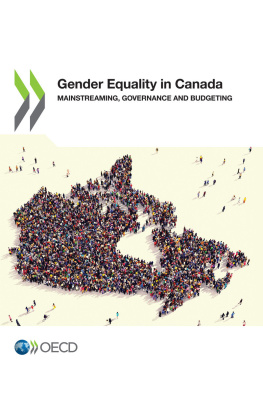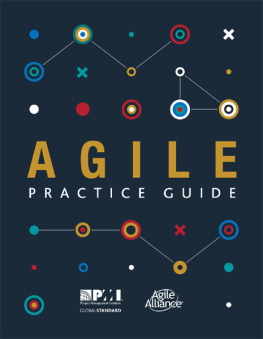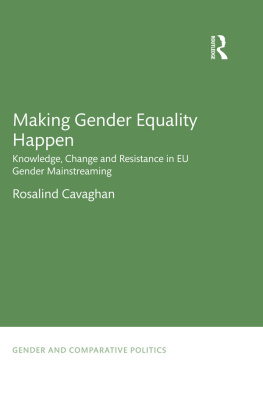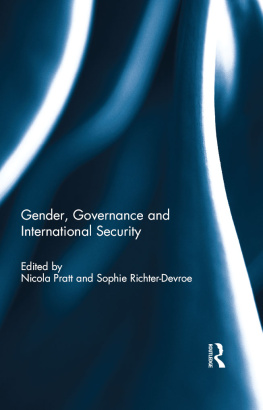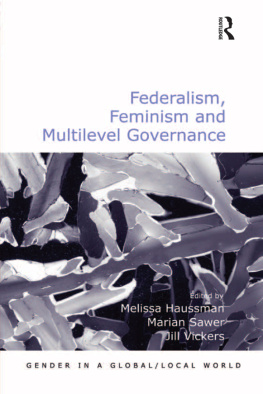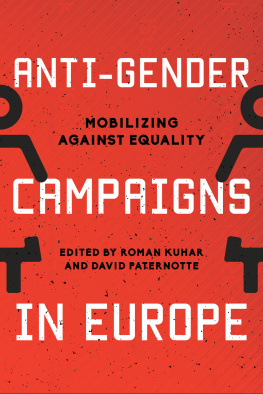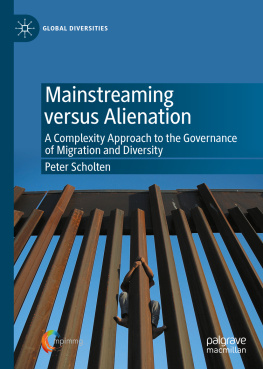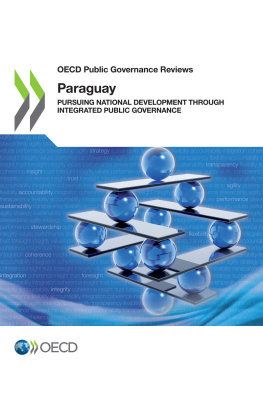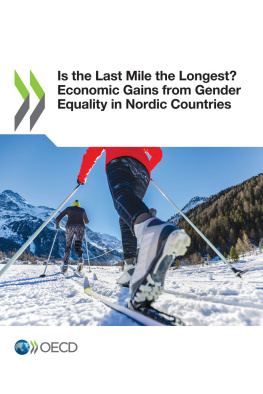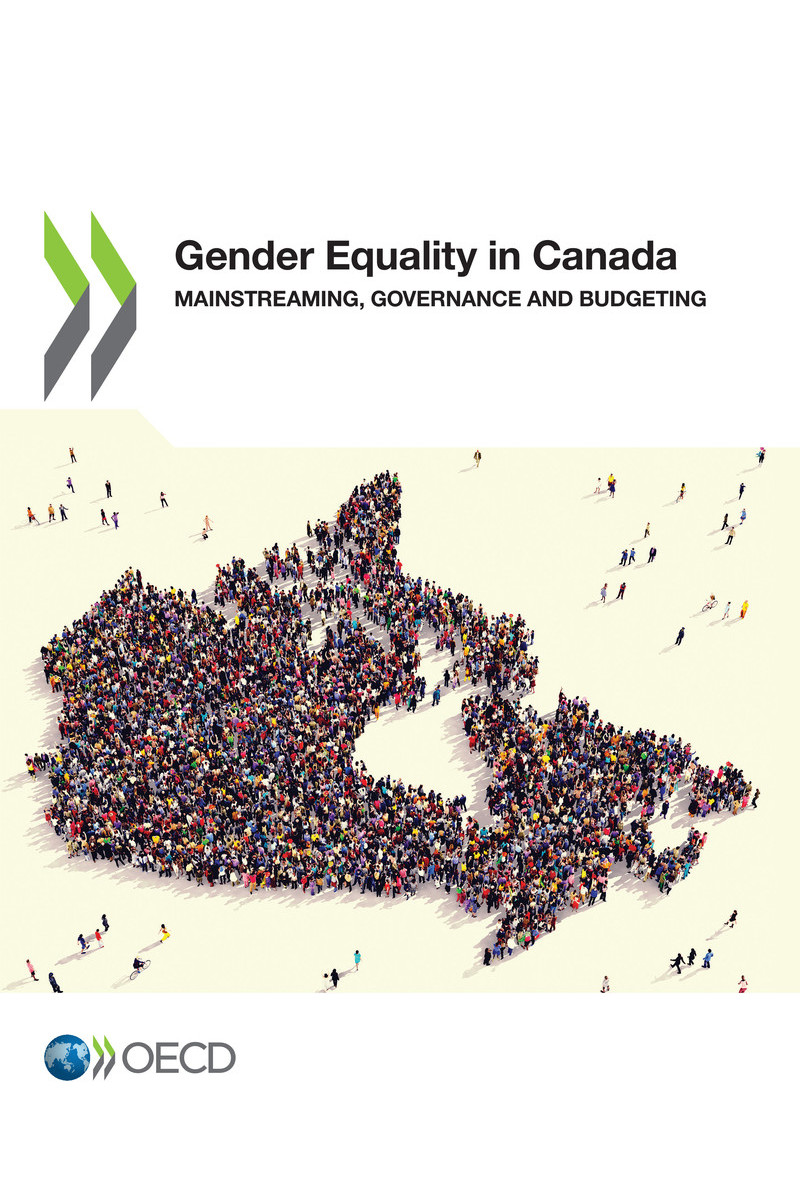Gender Equality in Canada Mainstreaming, Governance and Budgeting
Please cite this publication as:
OECD (2018), Gender Equality in Canada: Mainstreaming, Governance and Budgeting , OECD Publishing, Paris.
https://doi.org/10.1787/9789264301108-en
Metadata, Legal and Rights
ISBN: 978-92-64-30109-2 (print) - 978-92-64-30110-8 (pdf) - 978-92-64-30326-3 (HTML) - 978-92-64-30325-6 (epub)
DOI: https://doi.org/10.1787/9789264301108-en
This work is published under the responsibility of the Secretary-General of the OECD. The opinions expressed and arguments employed herein do not necessarily reflect the official views of OECD member countries.
This document, as well as any data and any map included herein, are without prejudice to the status of or sovereignty over any territory, to the delimitation of international frontiers and boundaries and to the name of any territory, city or area.
The statistical data for Israel are supplied by and under the responsibility of the relevant Israeli authorities. The use of such data by the OECD is without prejudice to the status of the Golan Heights, East Jerusalem and Israeli settlements in the West Bank under the terms of international law.
Photo credits: Cover Arthimedes/Shutterstock.com
Corrigenda to OECD publications may be found on line at: www.oecd.org/publishing/corrigenda .
OECD 2018
You can copy, download or print OECD content for your own use, and you can include excerpts from OECD publications, databases and multimedia products in your own documents, presentations, blogs, websites and teaching materials, provided that suitable acknowledgement of OECD as source and copyright owner is given. All requests for public or commercial use and translation rights should be submitted to .
Foreword
There is growing awareness in the global community that gender equality is a cornerstone of inclusive growth. Canada scores well on several metrics of gender equality. Over the past three years, the Canadian government has invested in strengthening the federal governance framework for gender equality by developing institutions, policies, tools and accountability structures to promote gender equality and gender mainstreaming. Canada is now one the few OECD countries where gender analysis is mainstreamed within routine Cabinet policy processes, in accordance with the 2015 OECD Recommendation on Gender Equality in Public Life (2015 Recommendation) and the 2013 OECD Recommendation of the Council on Gender Equality in Education, Employment and Entrepreneurship .
This OECD Review assesses the policy and institutional framework for delivering gender equality results for Canadians from a whole-of-government perspective, including the systems in place for mainstreaming gender considerations into the policy and decision-making cycles and the budget. It considers the scope for further action with reference to the 2015 Recommendation, and proposes a number of measures to expand gender mainstreaming, strengthen the governance framework for gender equality and advance gender budgeting in Canada. It is designed to assist the Government of Canada in charting a course for achieving better outcomes in gender equality.
The OECDs strong focus on gender equality, in collaboration with other international organisations, has been crucial for raising the profile of the gender agenda internationally. The 2015 Recommendation proposes concrete measures that countries can implement to advance mainstreaming and implementation of gender equality. In this context, the OECD's work on gender budgeting provides insights into how this tool can be best implemented to help deliver gender equality results.
Acknowledgements
This OECD Review is published by the Public Governance Directorate of the OECD under the guidance of Marcos Bonturi, Director for Public Governance, and overall supervision of Jon Blondal, Head of the Budgeting and Public Expenditures Division, and Martin Forst, Head of the Governance Reviews and Partnerships Division.
The Review was overseen by Tatyana Teplova, Senior Counsellor for Gender and Inclusiveness, and Ronnie Downes, Deputy Head of the Budgeting and Public Expenditures Division. It was primarily authored by Pinar Guven (Policy Analyst, Gender Mainstreaming) and Scherie Nicol (Policy Analyst, Gender Budgeting). The authors would like to thank Ronnie Downes and Elena Gentili who made significant contributions. It also benefited from the counsel of Elisabet Borrs Carbajo from the Ministry of Finance and Public Administration in Spain, and peer discussions at the OECD's 2018 Public Governance Committee Meeting.
The authors appreciate the views of experts at the Government of Canada including Justine Akman, Jean Lamirande, Alison McDermott, and Julia Smith. The authors also appreciate the considerable guidance of Michelle d'Auray, Ambassador and Permanent Representative to the OECD, Canada. The authors would like to thank Alba Bosch, Amy Coetzee, Andrew Davies, Gamze Igrioglu and Andrea Uhrhammer from the OECD Secretariat for their contributions. The authors also appreciate the suggestions and recommendations of experts at the OECD from the Economics Department and the Directorate for Employment, Labour and Social Affairs, in particular Monika Queisser, Senior Counsellor and Head of Social Policy Division. Benjamin Jouannes and Lyora Raab provided logistical support, and Bonifacio Agapin, Amelia Godber and Roxana Glavanov provided publication support.
Abbreviations and acronyms
CEDAW
Convention on the Elimination of all forms of Discrimination Against Women
CSO
Civil Society Organisation
EA
Environmental Assessment
GBA+
Gender-Based Analysis Plus
GDP
Gross Domestic Product
GRF
Gender Results Framework
FEWO
House of Commons Standing Committee on the Status of Women
FINA
House of Commons Standing Committee on Finance
FPT
Federal, Provincial and Territorial
IIU
Impact and Innovation Unit
LGBT
Lesbian, Gay, Bisexual and Transgender
OAG
Office of the Auditor General of Canada
OECD
Organisation for Economic Cooperation and Development
PBO
Parliamentary Budget Office
RDU
Results and Delivery Unit
TBS
Treasury Board Secretariat
SDGs
Sustainable Development Goals
STEM
Science, Technology, Engineering and Mathematics
SWC
Status of Women Canada
Executive summary

